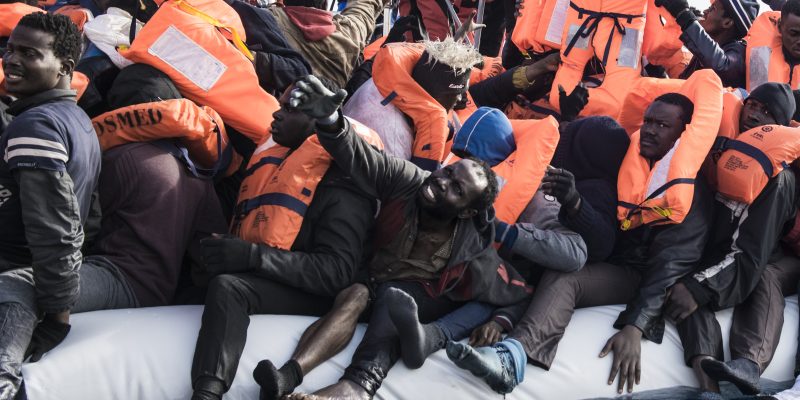1. NGOS and rescue operations at sea: the facts
The controversy over rescue efforts in the Mediterranean has been raging in politics and the media over the last few weeks. L’Espresso has put together 11 essential FAQs about humanitarian NGOS, rescue operations out at sea and the prosecutors’ investigations (also read our own in-depth analysis on everything that is false and misleading about the accusations and how the NGOS actually work and are funded).
2. A tragedy where no one is accountable
As the attacks on the NGO rescuing lives at sea continue, Fabrizio Gatti writes again in La Repubblica about the tragedy in the Mediterranean on October 11, 2013, when 268 people – including dozens of children – were left to drown by the Italian navy. The authorities could have rescued them, but they chose to ignore the increasingly desperate calls from the ship in distress. No one has yet taken responsibility for this massacre.
3. Libya, no country for migrants (say the UN and the International Criminal Court)
The disastrous situation in Libya is well known, after years of reporting from humanitarian groups and the official accusations from the UN High Commissioner for Human Rights and the International Organization for Migration (IOM): at least 20,000 people in the country are being detained illegally, and a veritable slave marked is thriving. Now the International Criminal Court is collecting evidence of the serious, systematic crimes against migrants. Read the article in Al Jazeera (as well as our own in-depth analysis on everything that is wrong with the deal with Libya).
4. Whose sea is this?
It is not only the situation on Libyan territory that is alarming, but also the way Libyan authorities intervene: the coastguard has been accused of carrying out increasingly aggressive and dangerous manoeuvres (also jeopardising the safety of humanitarian crews, as Sea Watch denounced) to intercept migrants at sea, and bring them back to Tripoli (in flagrant violation of the non-refoulement principle enshrined in international law). Read the articles by Lizzie Dearden in the Independent, Ahmed Elumami for Reuters and Giacomo Zandonini in La Repubblica.
5. Greece and the refugees
Greece and the refugees: between deterrence and integration. Daniel Howden’s report for the Refugees Deeply Quarterly analyses the complex situation of a reception system on the verge of collapse: poorly run camps, violations of rights, an unescapable limbo for thousands of asylum seekers.
6. Milan and the migrants, are we witnessing a crisis?
From the raid against migrants at Central Station “in the name of safety and decorum” to the controversy over the “no-walls parade” of May, 20: what is happening with migrants in Milan? Are we witnessing a crisis of its reception system? Read Annalisa Camilli’s analysis for Internazionale.
7. Melilla, its borders and their consequences
Marta Bausells’s report in the Guardian takes us to Melilla, a Spanish city in mainland Africa, surrounded by fortified fences to keep migrants out. A harsh measure, and Europe dirty secret 10 years ago, now paradoxically a model for closing borders to migrants and refugees (as we explained in our own in-depth analysis) – but what will be the consequences?
8. The new lives of refugees in New York
Fleeing from war, violence and persecution, and building a new life in a place where everyone is a foreigner, no one judges you and you can suddenly find yourself at home. These are the stories of refugees in New York, between Brooklyn and the Bronx, as told by Sulome Anderson in the Village Voice.
9. No asylum for “Snowden’s angels”
In 2013, they took in and hid the world’s most famous whistleblower, and now they are facing deportation: Hong Kong has rejected the asylum claims of the Sri Lankan and Filipino nationals who opened their homes to Edward Snowden. Read the stories in the CNN and BBC websites.
10. Sabir, a festival and a plea for solidarity in the Mediterranean
The Sabir Festival – organised ARCI, Caritas and Acli – has just ended its third edition: three days full of panels, training sessions and culture on the island of Ortygia, a baroque jewel and the historical centre of Syracuse, Sicily. The festival called for citizens, institutions and associations to “side with those who are saving lives and practicing solidarity”. Read the report on the festival and the interview with Lampedusa doctor Pietro Bartolo by Giacomo Zandonini.
Translation by Francesco Graziosi.
Header photo by Federica Mameli/ SOS MEDITERRANEE/ Luz.









